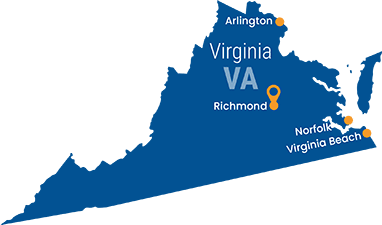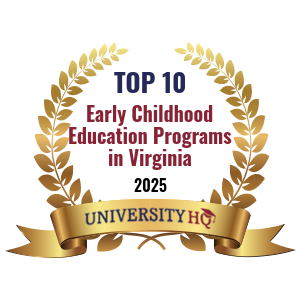What is Early Childhood Education?
Teaching is a noble profession. There will always be a need for teachers as long as there are children who need to learn. Choosing to enter the teaching profession requires a level of skill and dedication not everyone possesses. If you are one of those people who desire to help educate the next generation, future forecasts for jobs and the population indicate that your assistance will be greatly needed. This applies to all level of teaching and education, including preschool teachers.
According to the US Bureau of Labor Statistics (BLS), demand for preschool teachers is expected to grow faster than average from 2016 to 2026. This is because the population of preschool age children is expected to increase over the next decade. If you plan to teach in the state of Virginia, you’re also in luck; there is a demand for preschool and elementary education teachers. So, if you were considering becoming a preschool teacher, there is no time like the present to get started.

Featured Online Programs
Top Ranked Campus & Online Early Childhood Education Programs in Virginia
University of Virginia
Score: 92.56
- Undergraduate Tuition
- In-State: $20,986
- Out-of-State:$58,014
- Net Price: $17,831
- Acceptance Rate: 17%
- Retention Rate: 97%
- Graduation Rate: 95%
- Total Enrollment: 25,924
- Undergrad Students: 17,612
- Graduate Students: 8,312
- Grads Salary: $84,000
- Student-to-faculty: 15:1
George Mason University
Score: 78.3
- Undergraduate Tuition
- In-State: $13,815
- Out-of-State:$39,397
- Net Price: $18,900
- Acceptance Rate: 89%
- Retention Rate: 87%
- Graduation Rate: 69%
- Total Enrollment: 39,527
- Undergrad Students: 27,666
- Graduate Students: 11,861
- Grads Salary: $82,000
- Student-to-faculty: 16:1
James Madison University
Score: 74.07
- Undergraduate Tuition
- In-State: $13,576
- Out-of-State:$30,790
- Net Price: $26,317
- Acceptance Rate: 76%
- Retention Rate: 90%
- Graduation Rate: 81%
- Total Enrollment: 22,758
- Undergrad Students: 21,006
- Graduate Students: 1,752
- Grads Salary: $75,000
- Student-to-faculty: 17:1
Old Dominion University
Score: 69.78
- Undergraduate Tuition
- In-State: $12,262
- Out-of-State:$32,662
- Net Price: $16,150
- Acceptance Rate: 91%
- Retention Rate: 76%
- Graduation Rate: 44%
- Total Enrollment: 22,541
- Undergrad Students: 17,736
- Graduate Students: 4,805
- Grads Salary: $76,000
- Student-to-faculty: 15:1
Virginia Commonwealth University
Score: 69.2
- Undergraduate Tuition
- In-State: $16,458
- Out-of-State:$39,042
- Net Price: $22,852
- Acceptance Rate: 93%
- Retention Rate: 86%
- Graduation Rate: 65%
- Total Enrollment: 28,238
- Undergrad Students: 21,205
- Graduate Students: 7,033
- Grads Salary: $72,000
- Student-to-faculty: 17:1
Regent University
Score: 64.74
- Undergraduate Tuition
- In-State: $20,686
- Out-of-State:$20,686
- Net Price: $18,314
- Acceptance Rate: 41%
- Retention Rate: 66%
- Graduation Rate: 54%
- Total Enrollment: 10,168
- Undergrad Students: 4,577
- Graduate Students: 5,591
- Grads Salary: $63,000
- Student-to-faculty: 20:1
Bluefield University
Score: 62.74
- Undergraduate Tuition
- In-State: $29,696
- Out-of-State:$29,696
- Net Price: $22,191
- Acceptance Rate: 63%
- Retention Rate: 49%
- Graduation Rate: 27%
- Total Enrollment: 989
- Undergrad Students: 694
- Graduate Students: 295
- Grads Salary: $81,000
- Student-to-faculty: 15:1
Liberty University
Score: 58.53
- Undergraduate Tuition
- In-State: $21,222
- Out-of-State:$21,222
- Net Price: $29,692
- Acceptance Rate: 99%
- Retention Rate: 79%
- Graduation Rate: 63%
- Total Enrollment: 103,068
- Undergrad Students: 52,823
- Graduate Students: 50,245
- Grads Salary: $63,000
- Student-to-faculty: 18:1
Laurel Ridge Community College
Score: 49.81
- Undergraduate Tuition
- In-State: $4,928
- Out-of-State:$10,931
- Net Price: $6,153
- Acceptance Rate: 100%
- Retention Rate: 69%
- Graduation Rate: 39%
- Total Enrollment: 5,935
- Undergrad Students: 5,935
- Graduate Students: N/A
- Grads Salary: $36,600
- Student-to-faculty: 27:1
Bryant & Stratton College-Virginia Beach
Score: 26.35
- Undergraduate Tuition
- In-State: $18,457
- Out-of-State:$18,457
- Net Price: $11,607
- Acceptance Rate: 100%
- Retention Rate: 40%
- Graduation Rate: 28%
- Total Enrollment: 1,339
- Undergrad Students: 1,339
- Graduate Students: N/A
- Grads Salary: N/A
- Student-to-faculty: 19:1
Steps to Become an Early Childhood Education Teacher in Virginia
Virginia has a specific set of guidelines potential teachers are required to follow in order to teach in the state. Although employment can be attained in a preschool setting with an associate degree, in order to teach and run a preschool classroom, a bachelor's degree is required. A license is also a requirement to teach preschool in the state of Virginia. The process to attain licensure is outlined below.
Find Your Online Early Childhood Education Program
Attaining a license to teach in the state of Virginia takes dedication and hard work, but the process is worth it if you want to teach children. Since the demand for teachers is not expected to decrease, there is a certain level of job security that comes with teaching; there is also room for advancement. If you choose to move from teaching preschool to elementary school-aged children, that is an option. You can also opt to leave the classroom and move into an administrative role. The path you choose is up to you but getting a degree and becoming a preschool teacher in Virginia is a good place to start.
Step 1. Earn Your Degree
The degree must be from a college or university with regional accreditation. Examples of acceptable accreditation boards include the Higher Learning Commission and the Southern Association of Colleges and Schools. On top of that, the school must offer an educator preparation program, which means you will take specific courses that meet state guidelines and the program will end with a student teaching experience. To obtain a license to teach preschool, an elementary education specialization for either pre-K - 3 or pre-K - 6 must be included as part of the degree.
National Online Rankings - Best Early Childhood Education Associate Colleges National Online Rankings - Best Early Childhood Education Bachelors Colleges National Online Rankings - Best Early Childhood Education Masters CollegesStep 2. Pass Your Exams
Virginia requires its teacher to take and pass several exams. First, the PRAXIS CORE Academic Skills for Educators, which includes reading, writing, and mathematics sections. Then, for those who wish to teach in early childhood or elementary education, you must also take the Elementary Education: Multiple Subjects exam. You will take these tests after you have obtained your bachelor’s degree in order to prove your competency in the subjects you will teach. Along with those two exams, Virginia also requires teaching candidates to take and pass the Virginia Communication and Literacy Assessment (VCLA). This exam is taken after all college requirements have been fulfilled as required by the Virginia State Board of Education.
Finally, teachers who want to be licensed in the state of Virginia must complete several specialized courses:
- Certification of Child Abuse and Neglect Recognition and Intervention Training - this course helps educators recognize the signs of child abuse and trains them on how to effectively report and intervene when abuse is identified. This course is a part of most education programs in the state of Virginia, but for those who are applying with degrees from other states, the course can be taken at no cost for the teaching candidate.
- Emergency First Aid, CPR including hands-on practice, and AED training or certification
- Dyslexia Awareness Training - as with the Certification of Child Abuse Recognition and Intervention, this course is included in VA teaching curriculums but can be taken at no cost for degree holders from other states.
Step 3. Apply for Your License
The following steps are required to apply for a teaching license in Virginia
- College Verification Form - the form must be completed by the certification or licensure officer of the college or university where each program was completed. For example, if you have an associate degree from one school and a bachelor’s degree from another, the officer from both schools must provide a verification form. The form also must include verification of each student teaching practicum that was completed.
- Report on Experience - this form is filled out by an appropriate official at the school or organization where you worked or taught. For instance, you taught in a preschool classroom during your students teaching experience while attaining your bachelor's degree. An official from the school you taught at will need to complete this form.
- Submission of the PRAXIS I, II and VCLA exam results.
- Transcripts from all schools attended where coursework was completed. These must be official, sealed transcripts.
- Proof that the Child Abuse and Neglect Recognition and Intervention training has been completed.
- Proof that the Emergency First Aid, CPR including hands-on practice, and AED training and certification have been completed.
- Proof that Dyslexia Awareness training has been completed.
- Application fee - As of 2019, the fee for in-state applicants is $100 and $150 for those who live outside Virginia. The address on the application determines the application fee.
Popular Career Choices:
- Preschool Teacher
- Kindergarten Teacher
- Elementary School Teacher
- Special Education Teacher
Potential Careers and Salaries for Graduates
There are several areas where potential teachers can focus their teaching interests. Many assume that the only place where preschool teachers can work are actual preschools. This is not the case. For the most part, any school or organization that offers services for children who are younger than school age (five or younger), should be supervised and taught by experienced, educated, and licensed preschool teachers.
- Public Schools:
Public school systems are adding pre-K programs to their offerings, which is creating a need for preschool teachers to work in these classrooms. These programs appeal to parents because, for those who have several children, being able to place their kids in the same school is more convenient and offers a level of peace of mind. - Private Childcare:
For parents who aren’t ready to place their preschool age children in a traditional school setting, a private childcare situation, where the child can also receive a level of education and learning from a trained professional, is a positive alternative. - Private Schools:
Schools that are nontraditional, religious, or otherwise offer a private school education are required to have teachers who are certified and licensed by the state of Virginia. - Head Start Programs:
Head Start helps children of low-income families with education, play, and social services. Trained preschool teachers are needed to help teach and assess the needs of these children and their families. - Community-based Programs:
Groups and organizations often offer before- and after-school care services for young children, as well as daycare services for preschool-aged children. These programs need licensed and trained teachers to run the programs and help secure funding. - Faith-based Programs:
Churches, synagogues, and other religious organizations can offer programs for their parishioners’ children and other kids in the community. From before- and after-school care programs to full-fledged preschools and more, licensed teachers are needed. - Military Programs:
Preschool children on military bases also require education offerings. The military sometimes provides this through on-base schools and services. They bring in a trained teacher to teach these school programs and it is a great opportunity to serve military families without necessitating actual military service.
Average Salary for a Preschool Teachers
| Occupation | Entry-Level | Mid-Career | Late-Career |
|---|---|---|---|
| Preschool Teacher | $25,200 | $31,900 | $29,100 |
| Special Education Teacher | $38,500 | $41,400 | $50,800 |
| Professor of Education | $50,400 | $104,400 | $104,400 |
| School Psychologist | $54,200 | $61,000 | $73,300 |
Search All Programs















